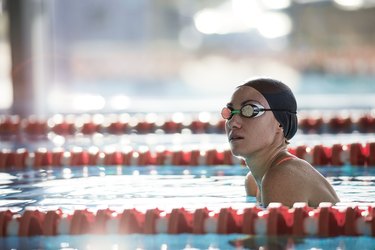
Whether you swim for recreation, fitness or sport, you want to feel good after your workout. The last thing you want is stomach pain after swimming. Post-swim stomach aches, pains and cramps can result from water-borne illness, ingesting air while swimming, or swimming with weak abs and poor conditioning. Understanding how these factors lead to stomach pain can help you relieve that sore stomach and enjoy swimming again.
Don't Drink the Water
Video of the Day
According to the Centers for Disease Control and Prevention (CDC), recreational water illnesses are caused by exposure to germs or chemicals found in the water where people swim. Infections contracted from these germs can affect the gastrointestinal and respiratory systems, skin, ears, eyes, nerves and wounds. Diarrheal illness is the most common result of infections contracted from recreational waters.
Video of the Day
The chemicals used to treat swimming pool water, especially if it's heavily chlorinated, can make you sick if ingested in large enough quantities. Chlorine poisoning produces symptoms that include severe stomach pain and vomiting, burns on the esophagus and blood in the stool or vomit. This almost always requires immediate medical care. Call 911, or call the Poison Help Hotline at 1-800-222-1222.
Recreational water illnesses are best prevented by avoiding contact with contaminated water. Practicing good personal hygiene will also help protect you while preventing the spread of illnesses to others. The CDC's guidelines for healthy swimming list steps you can take to protect yourself and your family.
Avoid Swallowing Air While Swimming
Improper breathing techniques can make a swimmer gulp air, resulting in belching, gas and painful stomach cramps after swimming. Known as aerophagia, this habit traps air in the gastrointestinal tract. If large quantities of air are ingested, the symptoms can be quite painful.
Swimmers are prone to aerophagia when they breathe through the mouth, take big gulps of air or don't exhale completely between breaths. To counteract this problem, practice controlled, regular breathing during your swim:
- Breathe through your nose whenever possible.
- Blow each breath out fully before taking the next one.
- Aim for smaller, more frequent breaths, which are easier to completely exhale than large gulps.
Issues like anxiety and habits such as poor food choices and meal scheduling can contribute to aerophagia. You may need to address these problems to get full relief.
Read more: How to Swim and Not Get Air in Your Stomach
Strengthen Your Abs and Core Muscles
Abdominal strain is another cause of stomach pain after swimming. Although swimming is a low-impact form of exercise, you can overstress the abs and core muscles with a vigorous swim workout. This is especially true if you are new to swimming or returning after lengthy absence. Symptoms of abdominal strain include:
- Tenderness in the stomach area
- Swelling, bruising or sudden sharp pain
- Feelings of stiffness or weakness
- Cramping or muscle spasms
If you experience this kind of stomach pain after swimming, you should rest to allow your strained muscles to recover. Apply cold packs soon after the injury to reduce inflammation. For the next several days, a heating pad or other warming device is helpful. Heat therapy relaxes stiff muscles and increases blood flow, helping speed the healing process.
When your symptoms subside, you can begin strengthening your abs and core so you'll be ready to swim again. Strong core muscles help you stabilize your body position in the water while adding power to your kick. This contributes to improved technique and a more efficient stroke, according to Bridge Athletic.
When Home Treatment Is Not Enough
Mild or infrequent stomach pain after swimming can usually be relieved with self-care and home treatment. However, if your stomach or abdominal pain is severe and persistent, getting worse instead of better, you need to see a doctor. Other signs that you need immediate medical attention include dizziness, blood in stool or vomit, fever or chills, and rapid heartbeat or breathing.
- Centers for Disease Control and Prevention: Recreational Water Illnesses
- MedlinePlus: Chlorine Poisoning
- Centers for Disease Control and Prevention: Steps of Healthy Swimming
- Healthline: What Is Aerophagia and How Is It Treated?
- Triathlete: Why Do I Get So Gassy After Swimming?
- WebMD: Swimming
- Healthline: Everything You Need to Know About Abdominal Strain
- Bridge Athletic: The Importance of Core Stability in Swimming